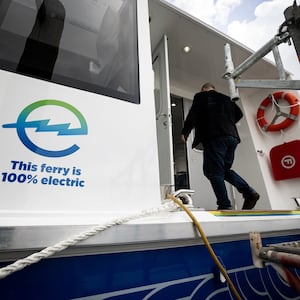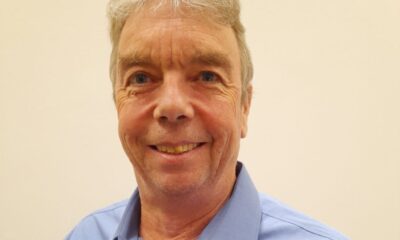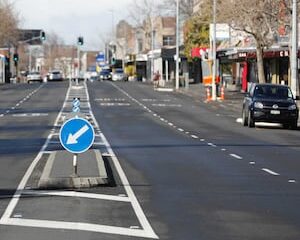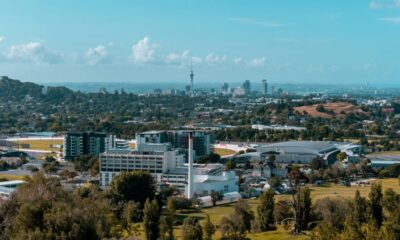World
Fullers Expands Electric Fleet Amid Auckland’s Diesel Decision

Fullers, a prominent ferry operator in New Zealand, has announced the acquisition of a second electric vessel from start-up Vessev, marking a significant step towards a greener fleet. This decision comes amidst a contrasting move by Auckland Council, which has opted to increase its reliance on diesel ferries for the Waitematā Harbour despite previous intentions to electrify its fleet.
Earlier this year, plans to electrify Auckland’s 27-ferry fleet stalled, with only two electric boats and two hybrids commissioned due to tightening government funding. The construction of megachargers, intended to support electric ferries, also lagged significantly behind schedule. Reports emerged last week that Auckland Transport (AT) would proceed with plans to purchase additional diesel ferries, reversing earlier commitments to reduce emissions.
In a report by the Herald, journalist Simon Wilson highlighted that the AT board, acting on the advice of its executive, decided to invest in more diesel ferries, citing “modern diesel” as the most reliable and cost-effective option for the immediate future. AT’s “future shaper,” Stacey van der Putten, conveyed this decision to councillors, indicating that the government will no longer provide funding for electric ferries.
This situation has raised concerns among advocates for low-emission public transport. The initial excitement surrounding the electrification of the ferry fleet has diminished as stakeholders grapple with the realities of funding and technological readiness.
Fullers’ decision to expand its electric fleet reflects a growing commitment to sustainable transport solutions. By acquiring a second electric craft, the company is positioning itself as a leader in environmentally friendly ferry operations. The collaboration with Vessev, a start-up focused on innovative marine solutions, underscores Fullers’ ambition to embrace green technologies.
The contrast between Fullers’ proactive stance and Auckland Council’s decision to favor diesel raises questions about the long-term vision for public transport in the region. As the world increasingly shifts towards sustainable energy, the reliance on diesel appears at odds with global trends aimed at reducing carbon emissions.
Fullers’ investment in electric ferries is not only a response to environmental concerns but also a strategic financial move. The company argues that transitioning to electric vessels will provide long-term savings and operational efficiencies. As the ferry industry evolves, Fullers aims to meet the demands of environmentally conscious consumers while maintaining competitive pricing.
The future of Auckland’s ferry services remains uncertain. With Fullers pushing ahead with electric options and Auckland Council doubling down on diesel, the trajectory of public transport in the region could significantly impact both environmental goals and economic viability.
As the debate continues, stakeholders will be closely monitoring developments in ferry technology and funding to see how these decisions will shape the future of transport in Auckland.
-

 Sports2 months ago
Sports2 months agoNetball New Zealand Stands Down Dame Noeline Taurua for Series
-

 Entertainment2 months ago
Entertainment2 months agoTributes Pour In for Lachlan Rofe, Reality Star, Dead at 47
-

 Entertainment4 weeks ago
Entertainment4 weeks agoNew ‘Maverick’ Chaser Joins Beat the Chasers Season Finale
-

 Sports7 days ago
Sports7 days agoEli Katoa Rushed to Hospital After Sideline Incident During Match
-

 Sports2 months ago
Sports2 months agoSilver Ferns Legend Laura Langman Criticizes Team’s Attitude
-

 Politics1 month ago
Politics1 month agoNetball NZ Calls for Respect Amid Dame Taurua’s Standoff
-

 Entertainment2 months ago
Entertainment2 months agoKhloe Kardashian Embraces Innovative Stem Cell Therapy in Mexico
-

 Sports5 days ago
Sports5 days agoJamie Melham Triumphs Over Husband Ben in Melbourne Cup Victory
-

 World3 months ago
World3 months agoPolice Arrest Multiple Individuals During Funeral for Zain Taikato-Fox
-

 Sports3 months ago
Sports3 months agoGaël Monfils Set to Defend ASB Classic Title in January 2026
-

 Entertainment1 month ago
Entertainment1 month agoTyson Fury’s Daughter Venezuela Gets Engaged at Birthday Bash
-

 Sports1 month ago
Sports1 month agoHeather McMahan Steps Down as Ryder Cup Host After Controversy





















